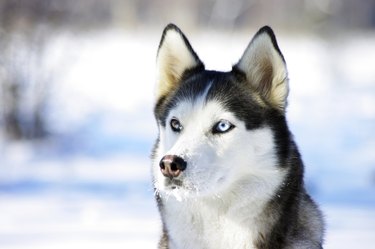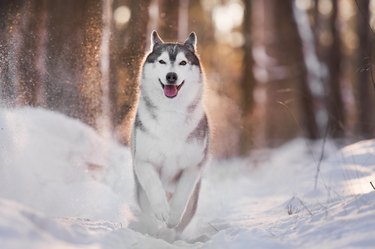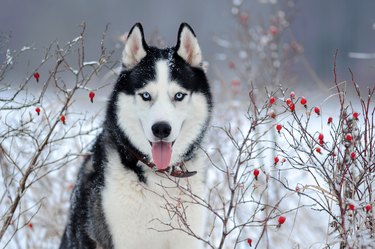Cold weather can bring on more than snow and wintery play days with your husky — it can actually alter your dog's nose. If your husky's nose becomes pale in the winter, she might have a condition known as snow nose. Snow nose doesn't require snow — and it doesn't even require particularly cold weather. A husky nose turning pink isn't a serious condition, but it might require some attention, particularly in the sun.

Video of the Day
Snow nose is not an illness
When the cold season comes, wild animals, domesticated animals, and humans experience some physical changes. Coats thicken, fur color changes, lips become chapped, dry skin causes discomfort, and some dogs' noses fade from black to black with a pink stripe through the middle. The alternation might look alarming, but don't worry.
Video of the Day
The temporary loss of pigment on the nose is a cosmetic issue and not associated with an illness. It will not harm your dog, but it can become painful if sunburned. Put sunscreen on the lighter areas of your dog's nose before she goes outside. Even winter sun can cause problems.
Husky nose turning pink
All healthy dogs should have moist, cool noses. With snow nose, dark pigment on a dog's nose will fade during the winter when days are shorter and weather is cooler. Snow nose is a common condition that causes the nose or parts of it to lighten to a pale pink color. Note, however, that this is different from dog breeds with Dudley nose, which refers to a yellow Lab with permanent chocolate pigmentation or cats with pink noses.
Snow nose is temporary. A pale husky snow nose will darkens again in spring and summer when the days are longer and the weather warms up, according to the American Kennel Club. Other dog breeds can also experience this phenomenon, including small ones like Boston terriers. The process often repeats in some dogs every year.
No snow required for snow nose

Snow nose occurs in the winter, with or without snow. It might be related to the hours of darkness being greater than daylight hours. Snow nose depigmentation does not usually affect the whole nose, but appears as a pink or light brown stripe down the center of the nose or as a white or pink spot.
The rest of the nose typically retains its typical coloration, be it black, brown, or liver-colored. According to the AKC, it's unknown why this happens, but since it occurs in dogs living in warm climates, cold temperatures might not play a major role in causation. Genetics is more likely.
Snow nose common in huskies
Technically called hypopigmentation, snow nose or "winter nose" is more likely to occur in Siberian huskies, other light-coated breeds or dogs with light-colored fur on the muzzle. Besides huskies, German shepherds, golden retrievers, malamutes, Labs, some small terriers, and Bernese mountain dogs are commonly affected. As dogs age, the color change can become permanent. The nose will be healthy — just more pale than before.
Other depigmentation conditions

Unless a veterinarian diagnoses your dog with a depigmentation condition other than snow nose, normal color should return in late spring or summer. If your dog's nose turns white, this is cause for concern. White means he does not have snow nose but possibly frostbite — and he should be examined by a veterinarian immediately.
Several other conditions can cause nose discoloration, such as plastic dish dermatitis, vitaligo, thyroid problems, para-aminobenzoic acid deficiency, or lupus erythematosus, which is not common in huskies. Your vet can suggest remedies for each of these conditions if necessary.